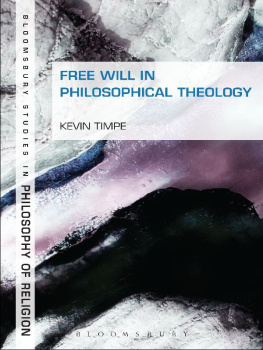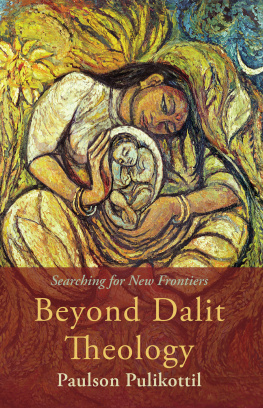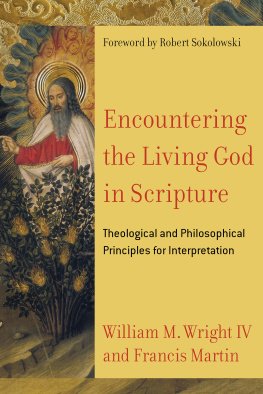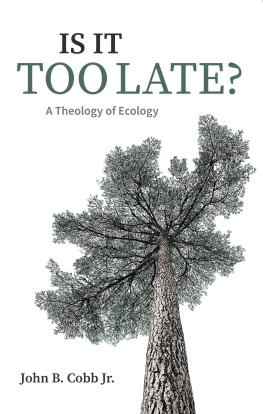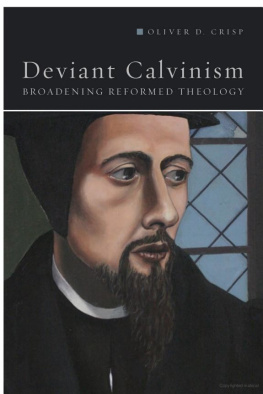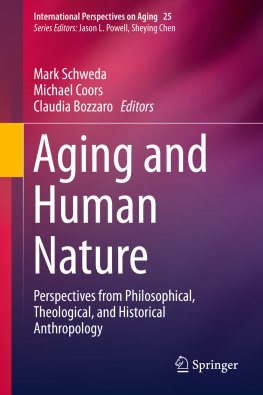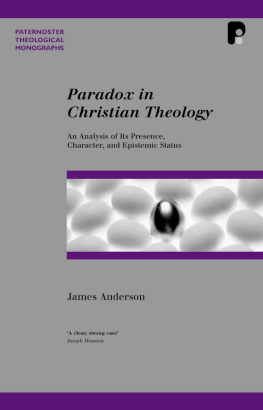Free Will in Philosophical Theology
Bloomsbury Studies in Philosophy of Religion
Series Editor: Stewart Goetz
Editorial Board: Thomas Flint, Robert Koons, Alexander Pruss, Charles Taliaferro, Roger Trigg, David Widerker, Mark Wynn
Titles in the Series
Freedom, Teleology, and Evil by Stewart Goetz
Image in Mind: Theism, Naturalism, and the Imagination by Charles Taliaferro and Jil Evans
Actuality, Possibility, and Worlds by Alexander Robert Pruss
Gods Final Victory: A Comparative Philosophical Case for Universalism by John Kronen and Eric Reitan
The Rainbow of Experiences, Critical Trust, and God by Kai-man Kwan
Thinking Through Feeling: God, Emotion and Passibility by Anastasia Philippa Scrutton
Philosophy and the Christian Worldview: Analysis, Assessment and Development edited by David Werther and Mark D. Linville
Goodness, God and Evil by David E. Alexander
Well-Being and Theism: Linking Ethics to God by William A. Lauinger
The Moral Argument (forthcoming) by Paul Copan and Mark D. Linville
Free Will in Philosophical Theology
Kevin Timpe
Bloomsbury Studies in Philosophy of Religion

For Emm,
If [she] is not the word of God God never spoke.
Cormac McCarthy, The Road
Contents
The majority of this book was written while I was a visiting research fellow at St Peters College at Oxford University during the 201011 academic year. The fellowship was funded by the Templeton Research Fellows Program, a program directed by Linda Zagzebski and Brian Leftow, and financed through the generous support of the John Templeton Foundation. The fellowship provided a wonderful opportunity to focus on writing for a year, and I am very thankful to all involved for the privilege of receiving this fellowship. My primary host at St Peters College was Tim Mawson, which whom I had many stimulating and engaging discussions about materials related to this project. I would also like to express my gratitude to Northwest Nazarene University for granting me a leave of absence during this period. I would like to thank the following colleges and universities for inviting me to present papers during my time at Oxford which would eventually find themselves folded into the present project: the Joseph Butler Society at Oriel College; Oxford Brookes University; the National University of Ireland, Maynooth; the Queens University Belfast; Trinity College Dublin; the University of Birmingham; University College Dublin; the University of Glasgow; the University of Rijeka, Croatia; and York University. The feedback I received on these occasions led to many improvements and clarifications of what follows. Besides the feedback, I would also like to thank the faculty at these universities for reminding me how wonderful and blessed it is to be a part of an international community of scholars. Closer to home, parts of this material were also presented at the American Catholic Philosophical Association, Baylor University, and the University of Missouri. Some of the materials from Chapters 1, 2, and 6 was presented at a Divine Freedom Writing Workshop where I benefited from the input of the other participants: Ryan Byerly, Justin Capes, David Hunt, Brian Leftow, High McCann, David McNaughton, Jonathan Parsons, Tim Pawl, Alexander Pruss, and Tina Talsma.
Students in my Analytic Theology course during the spring of 2012David Armour, David Hawley, and Brianna Chapmanwere subjected to early versions of most of the chapters. Id also like to thank the following individuals for comments on various parts of the manuscript: H. E. Baber, Tully Borland, Stephen Boulter, Jonny Brown, Jeroen De Ridder, David Efird, Shane Glackin, Susan Gottloeber, William Hasker, Audra Jenson, Simon Kettle, Mette Lebech, Brian Leftow, Paul Manata, Tim Mawson, Ross Parker, Tim Pawl, Dan ONiel, Linda Peterson, Scott Ragland, Bryan Reece, Mike Rota, Greg Sadler, Constantine Sandis, Eric Silverman, Neal Tognazzini, and Thomas Williams. As my research assistant, Audra Jenson also provided incredibly valuable editorial help in preparing the final manuscript for publication.
Work on this project was generously supported by the Analytic Theology Summer Stipend Program, sponsored by the John Templeton Foundation and the Center for Philosophy of Religion at the University of Notre Dame.
Portions of this project incorporate some of my previously published work. Parts of in the present volume. These works are included here with permission.
Im extremely grateful to Haaris Naqvi and Stewart Goetz at Bloomsbury for their support for this project.
Finally, Im most grateful for my loving family which makes my scholarship, as my life, worthwhile. Go Team MAJEK.
Freedom makes man a moral subject. When he acts deliberately, man is, so to speak, the father of his acts. Human acts, that is, acts that are freely chosen in consequence of a judgment of conscience, can be morally evaluated. They are either good or evil.
Catechism of the Catholic Church
I have attempted... to state the philosophy in which I have come to believe. I will not call it my philosophy; for I did not make it. God and humanity made it; and it made me.
G. K. Chesterton
Western philosophy has a long and venerable tradition of reflecting on the nature of free will. It is sometimes said that Augustine discovered the faculty of the will and as a result inaugurated philosophys fascination with issues related to free will. While philosophers prior to Augustine clearly discussed the closely related issues of, for example, voluntariness and agency, one finds in Augustine an explicit focus on free will that one would be hard-pressed to find in earlier thinkers. Augustine addressed the importance of free will in many of his works, including his famous Confessions and City of God, as well as in the earlier On Free Choice of the Will. And since Augustines day, the vast majority of the great philosophers from the medieval and modern periodsAnselm, Aquinas, Ockham, Scotus, Descartes, Hobbes, Hume, and Kant, to name but a fewhave written on free will. This trend continues into the contemporary philosophical literature; if anything, there is a more vibrant ongoing philosophical conversation about free will than ever. And there is no indication that this trend will change at any time in the near future.
But, as contemporary American political discourse indicates, the popularity of a topic doesnt always breed care or accuracy in the discussion of that topic. In a recent discussion of the importance of philosophical reflection on free will, Daniel Dennett says the following:
I recently confronted the question of why so many really intelligent people write such ill-considered stuff when the topic is free will. The answer... is that in some inchoate way they sensecorrectlythat it really matters, and they just dont want to contemplate the implications straightforwardly, in case the truth is too horrible to live with. This makes wishful thinking and other distortions of reason almost irresistible. If the arguments they are tempted by were somehow imbedded in less forbidding contexts, they would see through them in an instant. People dont do their best work when they think the stakes are astronomically high.
Dennetts belief that the stakes are highthat it matters that we get our beliefs about free will rightis perhaps one reason that discussions of free will have been so prominent in philosophy the past few decades.
Next page
